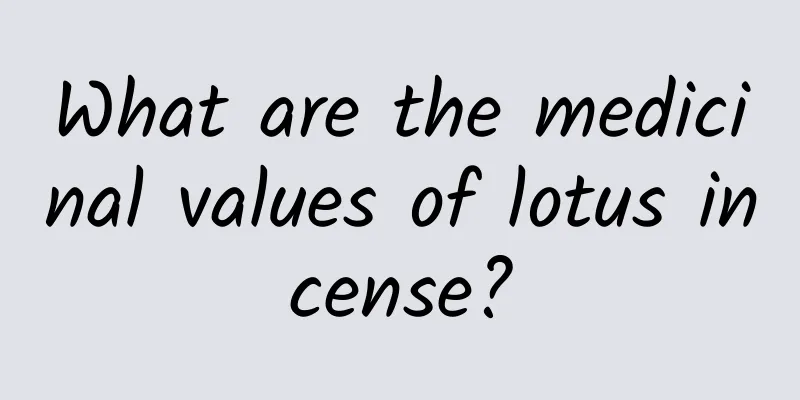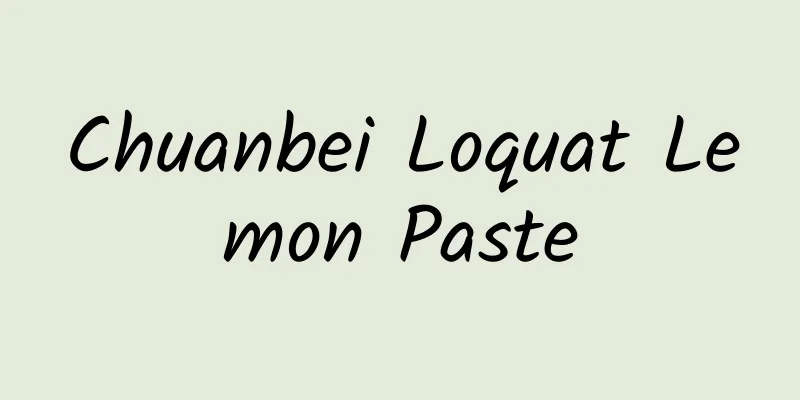What are the medicinal values of lotus incense?

|
I believe everyone is familiar with lotus leaves. We all know that the nutritional value of lotus leaves is relatively high. No matter what food it is in life, it has its unique value. Therefore, before eating, it is best to understand the efficacy and characteristics of these foods in order to judge whether you are suitable for eating this type of food, so as to avoid adverse reactions and cause certain effects on the body. So what is the medicinal value of lotus fragrance? Preparation and preservation methods: Harvest lotus leaves from June to July before the lotus flowers bloom. Large, neat, green leaves are preferred. Remove the petioles, dry them in the sun until they are 70% to 80% dry, fold them into a semicircle, and place them in a cool and ventilated place to dry. Fresh leaves or newly grown young leaves are also used in summer. Keep sealed and moisture-proof, or in a dry and ventilated place. Functional and therapeutic analysis: The chemical components of dried lotus leaves mainly include nelumbinine, citric acid, malic acid, gluconic acid, oxalic acid, succinic acid and other alkaline components with anti-mitotic effects. Pharmacological studies have found that lotus leaves have antipyretic, antibacterial and antispasmodic effects. After processing, the dried lotus leaves taste bitter and slightly salty, and are spicy and cool in nature. They have the effects of clearing away heat and dampness, raising yang and dispersing, removing blood stasis and stopping bleeding. Lotus leaves have diuretic and laxative effects. In addition, lotus leaves have the effects of clearing heart fire, calming liver fire, purging spleen fire, reducing lung fire, clearing heat and nourishing the mind, lowering blood pressure and promoting diuresis, astringing fluid and stopping sweating, stopping bleeding and consolidating essence. Deep processing and application: Lotus leaf extract (alkali) is extracted from dried and crushed lotus leaves using a series of methods including cellulase pretreatment, dilute hydrochloric acid extraction, ultrasonic-assisted extraction, and chloroform extraction. It is the main lipid-lowering active ingredient in lotus leaves and has been widely used in weight loss treatment for obese patients. Boiling water with dried lotus leaves for bathing infants and young children can help remove eczema and prevent prickly heat. The above is an introduction to the medicinal value of lotus incense. Now we know that the medicinal value of lotus incense is so high. It can not only help us reduce lung fire, but also improve constipation and make food digestible. Therefore, it is useful to understand some of the effects of food clearly, and we can make good use of the effects of food to regulate the body. |
<<: What are the medicinal values of Monstera
>>: Medicinal value of mussels
Recommend
It is hard to imagine what kind of mental state these mechanical animals were made in...
Do you still remember the mythical animal "t...
The efficacy and function of chestnut
Everyone is familiar with stone chestnut, of cour...
Is your skin dry and itchy in winter? These few methods are simple and effective →
Whether adults or children, many people will enco...
How troublesome is nucleic acid testing? I feel embarrassed to ask for the results after reading this.
Many people think Nucleic acid testing is just li...
The efficacy and function of Andrographis paniculata
Andrographis paniculata is mainly produced in Guan...
The efficacy and function of the stems and leaves of Trichosanthes kirilowii
The stems and leaves of Trichosanthes kirilowii a...
Aurora in Beijing? Navigation failure? Are these "abnormal phenomena" caused by it?
The Aurora was photographed in Beijing! On the ev...
What a "penalty"! The anchor was suspected of picking a national second protected plant, and the police intervened
"The Qinghai-Tibet snow lotus is picked in i...
"Catch" lightning, turn it into energy, storage is the key!
On September 15, affected by strong thunderstorm ...
The efficacy and function of the root of Pseudostellaria scabra
Many people are not very clear about the roots of...
The eight-day vacation for workers is more tiring than going to work. What can they do?
Socializing has a psychological and emotional imp...
What are the functions and effects of Cordyceps
Cordyceps can effectively help us elderly people ...
The efficacy and function of the stems and leaves of Water Gold Phoenix
For Chinese medicinal materials such as the stems...
Can you really understand the physical examination report? Abnormal blood lipid index actually indicates "it"!
Living in the fast-paced modern life, from mental...









